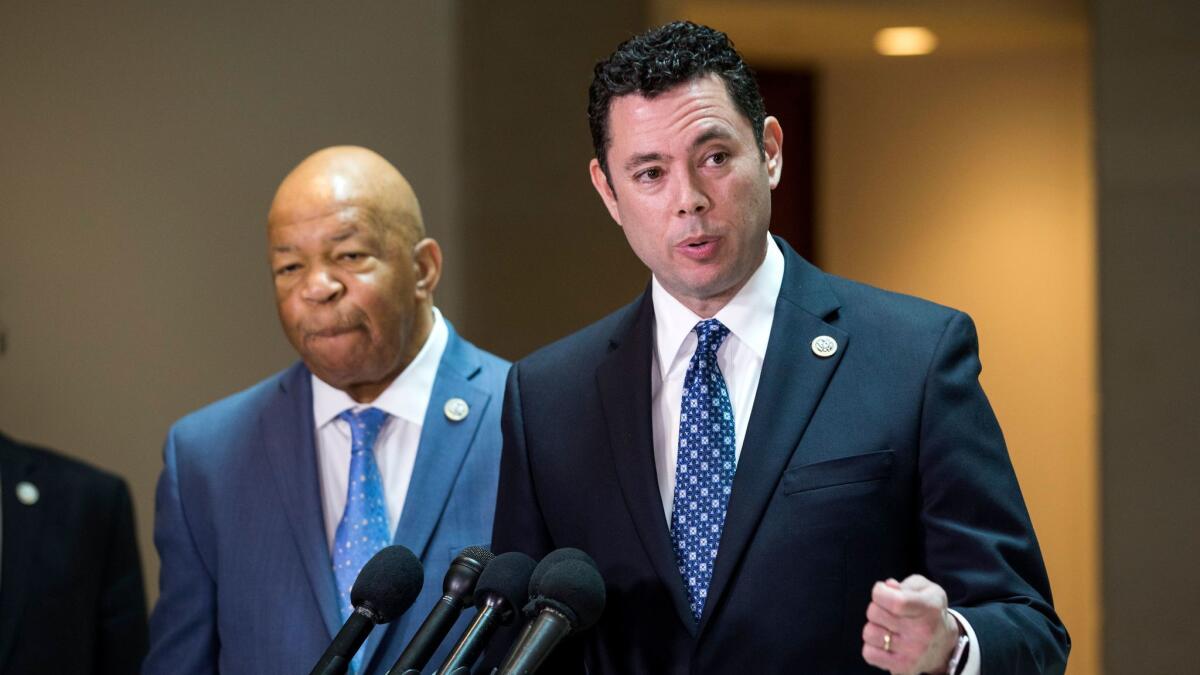Column: Is the GOP getting serious about the Russia investigation?

- Share via
Last week, the chairman of the House Oversight Committee, a loyal Republican, disclosed that President Trump’s former national security advisor probably broke the law when he accepted money from an arm of the Russian government. That’s a big deal — and not only because of what it says about the advisor, retired Lt. Gen. Michael Flynn. As happens so often, the cover-up may be worse than the crime.
Here are the facts: In 2015, before he joined Trump’s presidential campaign, Flynn accepted $33,750 from Russia Today, a Russian government television network, to give a speech in Moscow. As a retired Army general, Flynn needed to get formal permission from the Defense Department before working for a foreign government agency. There’s no evidence that he did so; the Pentagon has launched an investigation.
Even worse, Flynn apparently failed to disclose his Russian income when he renewed his U.S. government security clearance in 2016. If that omission was willful, it could be a felony.
Trump fired Flynn after only 24 days on the job — not because of his Russian income, but because he lied to Vice President Mike Pence about another set of contacts with Russia.
Republicans are hedging their bets. Nobody wants to be the next Nunes.
But this is about more than the president’s bad judgment in choosing his first top foreign policy advisor. Flynn is one of the key subjects of several investigations of possible collusion between the Trump campaign and Russia. His once-secret contacts with the regime of Vladimir Putin are a matter of public record; the question is whether anything more nefarious occurred. Now Flynn faces a Pentagon investigation that could lead to criminal charges.
So what did the White House do when the House committee asked for documents about the general’s foreign contacts?
It rejected the inquiry entirely, saying most of its records were none of the committee’s business. White House spokesman Sean Spicer called the request “outlandish.”
To use a word from an earlier scandal, the White House resorted to stonewalling — in defense of a disgraced aide whom the president fired more than two months ago. It makes the White House look as if it’s trying to protect Flynn — or, worse, persuade him not to talk. By doing so, it has gotten crosswise with Rep. Jason Chaffetz (R-Utah), chairman of the House Committee on Oversight and Government Reform, who until now was one of Trump’s staunchest defenders.
In an odd way, that’s good news. It’s one of several signs that the GOP-led congressional probes aren’t as somnolent as they look.
The House Intelligence Committee’s investigation nearly collapsed last month when its chairman, Rep. Devin Nunes (R-Tulare), made a fool of himself defending Trump’s bizarre charge that President Obama had wiretapped Trump Tower.
Now that probe has a new leader, Rep. K. Michael Conaway, a Texas Republican who’s highly respected in both parties.
“We’re back on track,” said Adam B. Schiff of Burbank, the top Democrat on the panel.
The Senate Intelligence Committee is moving slowly ahead, too. After news organizations revealed that it has only seven staff members working part-time on the case, its embarrassed chairman quickly announced that he’s hiring more. Meanwhile, Sen. Lindsey Graham of South Carolina has launched a mini-investigation in another committee, just in case the intelligence panel slows down.
So it looks as though the Trump administration has stimulated healthy competition among members of Congress to see who can run the best investigation.
What’s really going on, though, is that Republicans are hedging their bets. Nobody wants to be the next Nunes. Even loyalists like Chaffetz are unwilling to defend the White House on all fronts, because they don’t know what else may be out there.
In that sense, Nunes unwittingly performed a public service with his Keystone Kops counter-investigation: He showed his GOP colleagues what not to do.
The congressional probes still need bigger staffs. Even with the new hires, the main Senate investigation will still have only nine people, most of whom will also be working on other issues.
That’s why it would be a better answer to set up a special committee on foreign interference with the 2016 election. A special panel could devote more investigators to the job. (The House special committee on Benghazi, for example, had 46 staff members.)
Meanwhile, the FBI is still investigating, and its director, James B. Comey, has a reputation to salvage.
And an outside watchdog group, Citizens for Responsibility and Ethics in Washington, is pressing a lawsuit against Trump for deriving income from foreign governments through his private businesses.
Could anything more go wrong for the Trump clan? Sure: Ivanka just announced that she’s launching an Ivanka Fund to promote female entrepreneurship. The White House had to scramble to say the first daughter doesn’t plan to solicit donations or run the project herself, which — since she’s a federal employee — might have been illegal.
It’s still sensible to worry that the unanswered questions about foreign interference in the 2016 election will be swamped by other issues — or that loyalist Republicans will be tempted to drag their feet.
But the last week suggests that while the investigations aren’t moving very fast, they’re increasingly serious — even, in some measure, bipartisan. Trump’s scofflaw habits are keeping them alive.
Twitter: @DoyleMcManus
Follow the Opinion section on Twitter @latimesopinion or Facebook
MORE FROM OPINION
Why I’m trying to change how the FCC regulates the Internet
Trump needs a better approach to immigration because bullying isn’t cutting it
Trump’s tax plan would reward the wealthy and balloon the federal debt
Seven different ways to look at President Trump’s first 100 days
More to Read
A cure for the common opinion
Get thought-provoking perspectives with our weekly newsletter.
You may occasionally receive promotional content from the Los Angeles Times.







